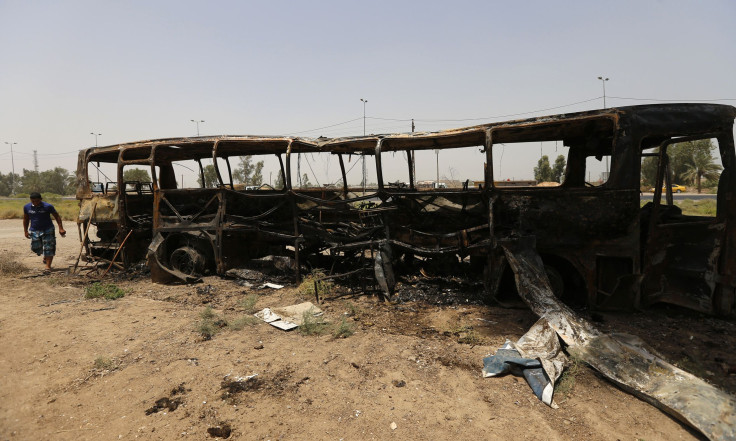Iraq: 61 Dead As Militants Attack Prisoner Convoy Near Baghdad

Militants attacked a convoy near Baghdad on Thursday, killing 52 prisoners and nine police officers, the Ministry of Justice and hospital officials told Reuters.
Roadside bombs were detonated as the prisoners were being transported in a bus from the town of Taji to Baghdad, 15 miles away. Gunmen then opened fire on the damaged convoy killing many, reports said. The prisoners, who are suspected militants, were being transferred after military bases in Taji, where they were imprisoned, were hit by mortar rounds at dawn on Thursday, Iraqi officials told Associated Press. The motive for the attack is not clear with no group claiming responsibility yet.
On July 11, Human Rights Watch, or HRW, said in a report that Iraqi security forces and the government-backed Shia militia had killed 225 Sunni prisoners over the last month, BBC reported. The killings were apparently carried out by the largely Shia Iraqi forces to avenge mass public executions allegedly carried out by Sunni militants from the Islamic State of Iraq and Syria in the cities they seized in Iraq's northwest. BBC also reported that Iraqi forces were killing captured Sunni militants to prevent them from rejoining ISIS' ranks.
In June, 69 prisoners were killed while being transported to a jail in Baghdad. Senior police officers reportedly told Reuters that the police had executed the 69 prisoners themselves and that it was not a militant attack that killed them. On Tuesday, 21 people were killed when a suicide bomber blew himself up at a police checkpoint in Baghdad as people made their way to a Shia shrine in the area.
Sectarian violence has threatened to rip the country apart since radical Sunni militants from ISIS have captured large parts of the country and declared an Islamic Caliphate in the northwest, and displaced several minority communities, including the region's ethnic Kurdish people. Sunnis and Kurds have accused Iraqi Prime Minister Nuri al-Maliki, a Shiite who has ruled the country since the fall of Saddam Hussein, of being a divisive leader and have demanded that he resign.
© Copyright IBTimes 2025. All rights reserved.





















